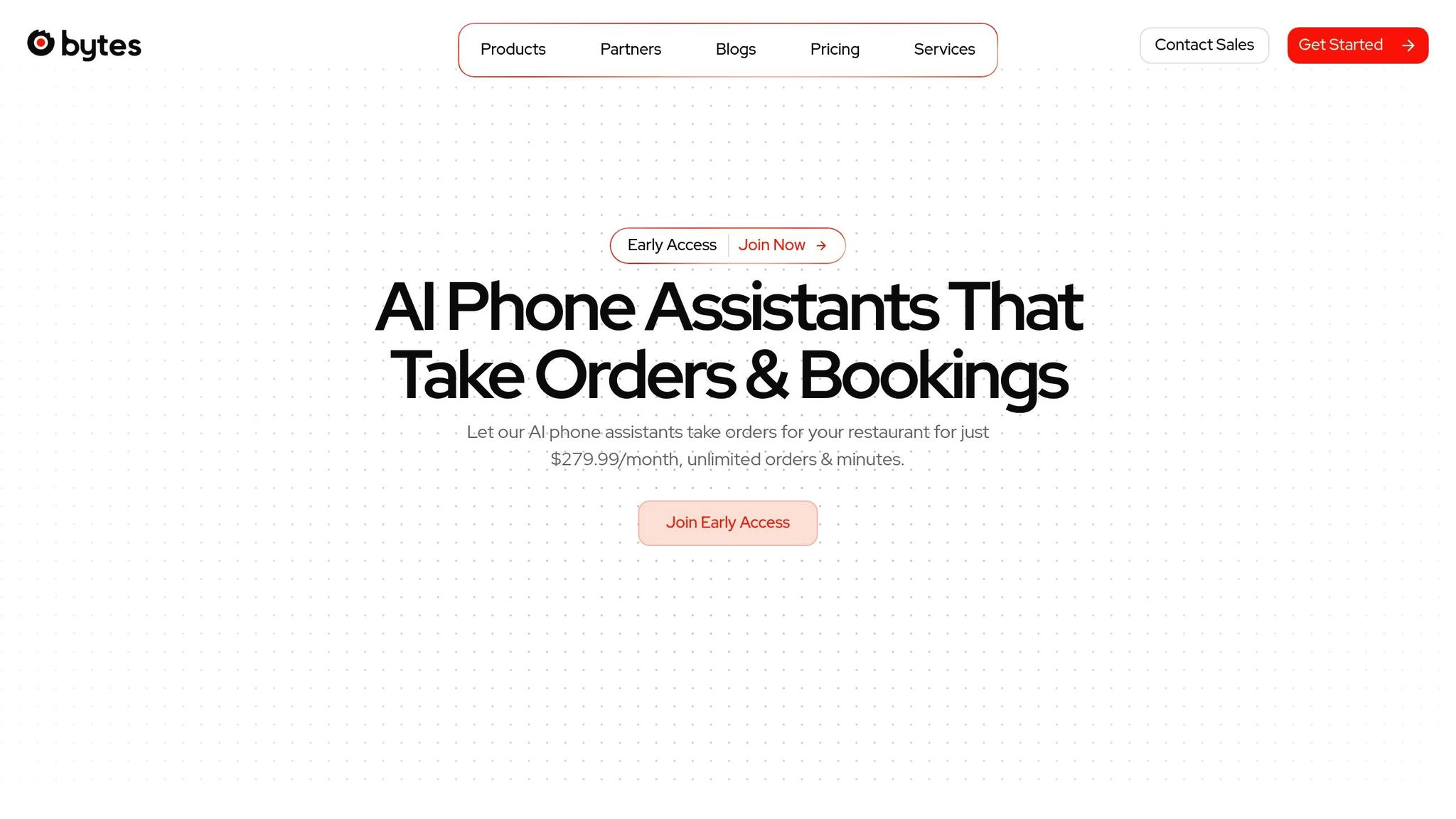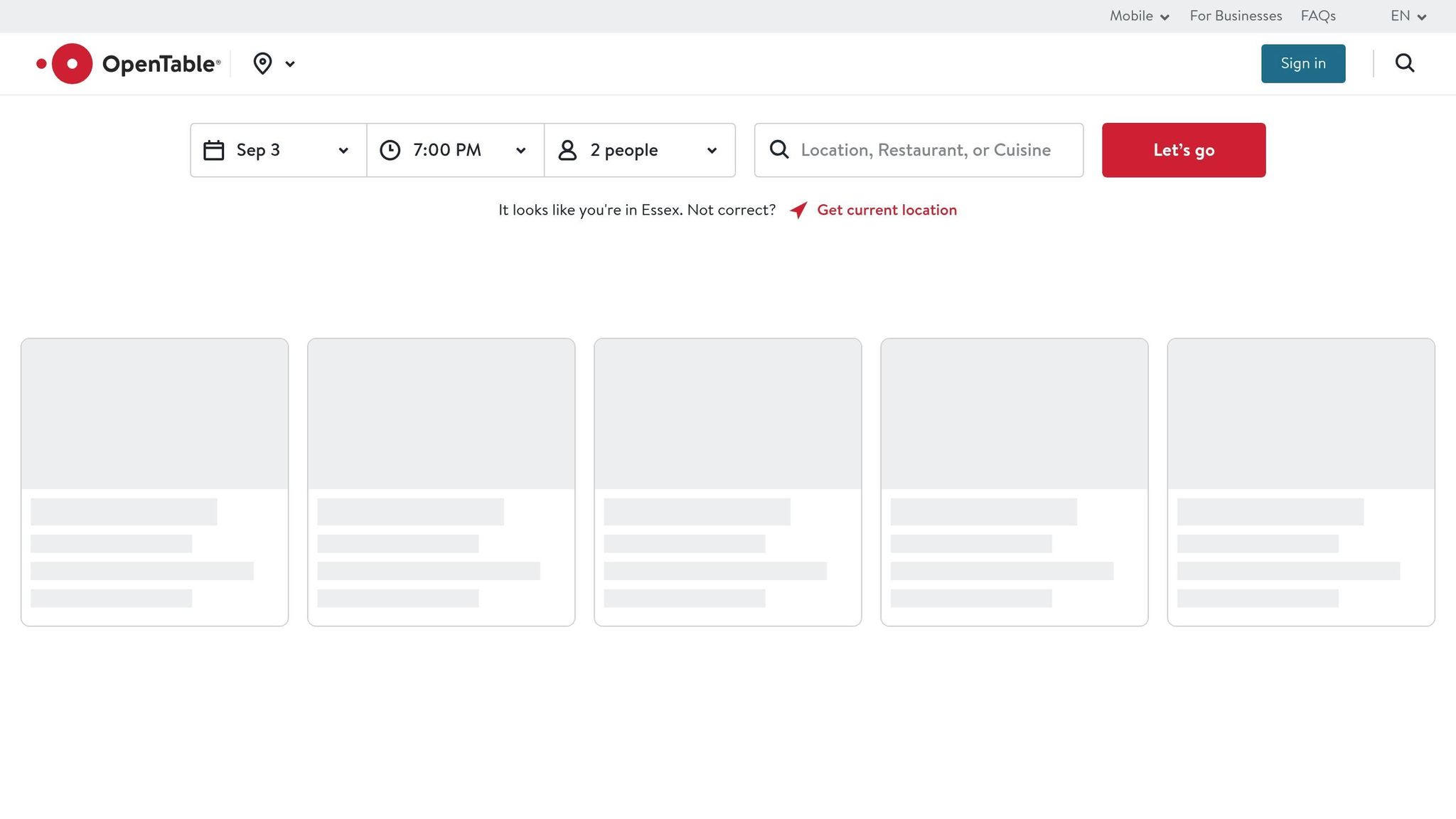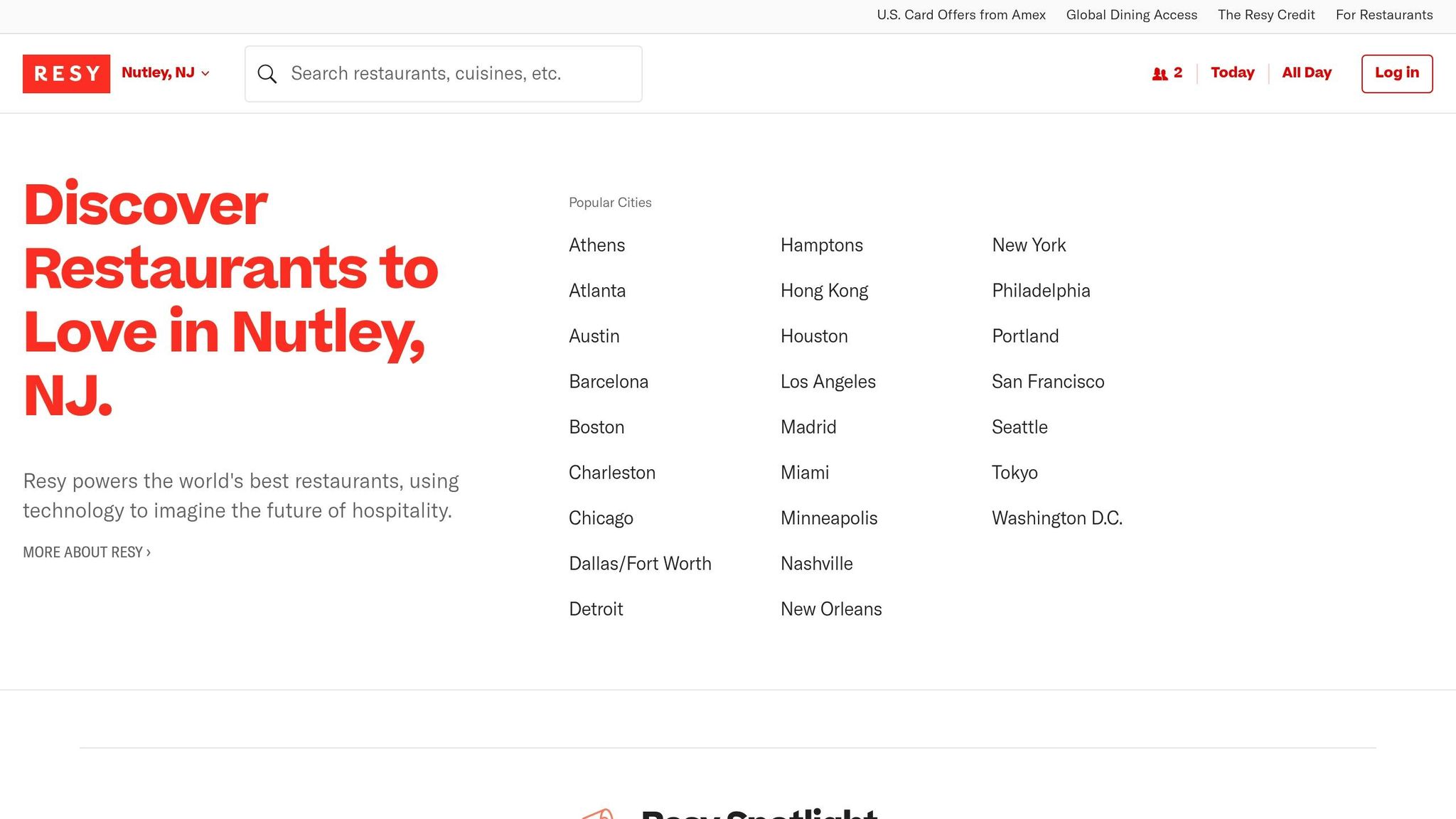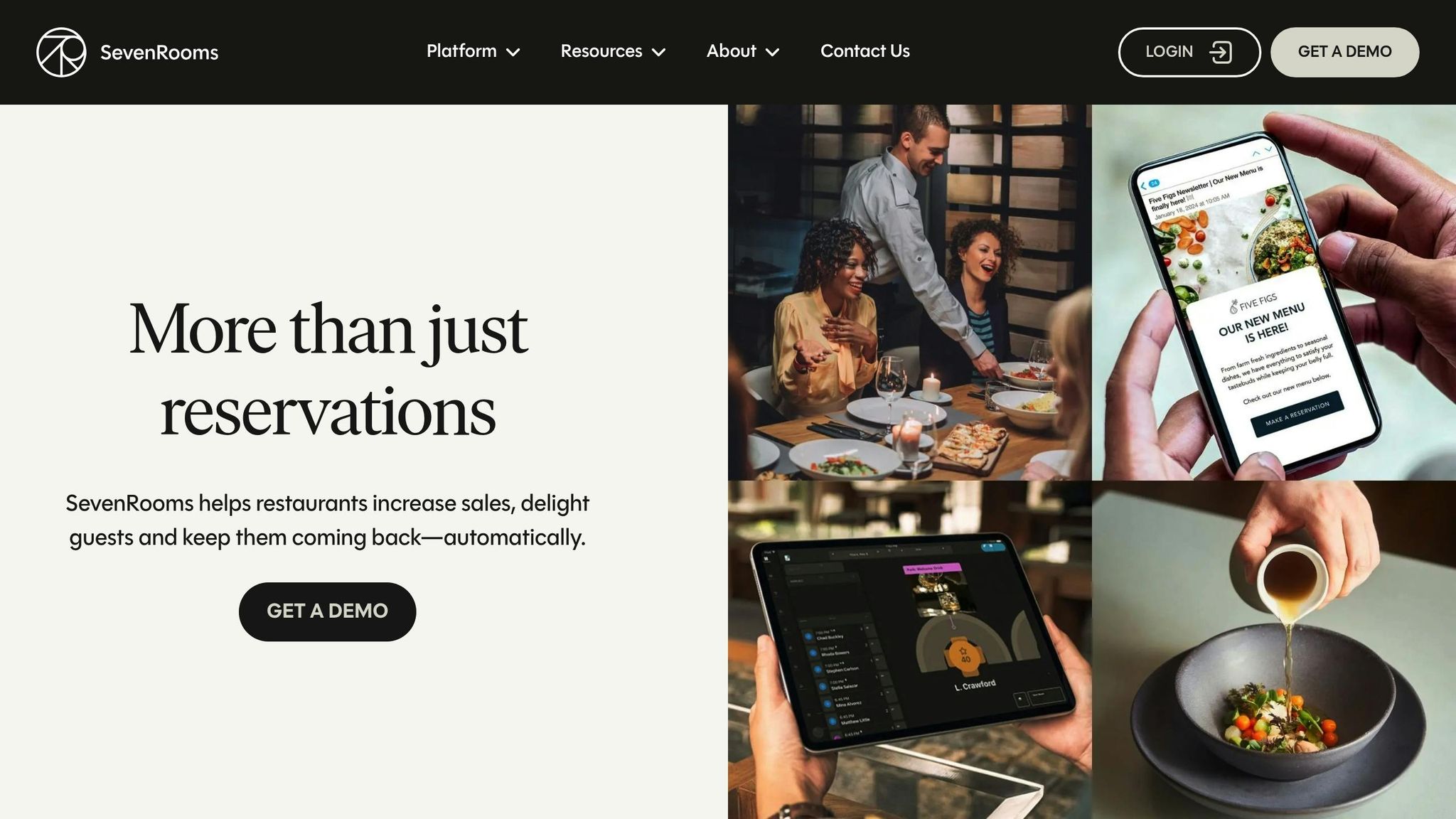Published September 3, 2025
Explore the top restaurant booking systems of 2025, designed to enhance efficiency and customer satisfaction while reducing no-shows.

In 2025, restaurant booking systems are more than just tools for reservations - they help restaurants improve efficiency, reduce no-shows, and enhance customer satisfaction. Whether you're running a small café or a high-end dining establishment, the right system can streamline operations and provide valuable insights for better decision-making. Here’s a quick overview of the top options this year:
Each platform offers unique features, so your choice depends on your restaurant's size, style, and goals. Below is a comparison to help you decide.
| Platform | Starting Price | Key Features | Best For | Limitations |
|---|---|---|---|---|
| AI Restaurant Solutions | $259.99/month | AI phone assistants, centralized dashboard, custom apps | Small to medium-sized restaurants | Some features still in development |
| OpenTable | $149–$499/month + fees | Large diner network, Google Reserve integration | High-volume, full-service restaurants | Per-cover fees can increase costs |
| Yelp Guest Manager | $129–$299/month | Direct booking via Yelp, POS integration | Restaurants with strong Yelp profiles | Usage restrictions on lower plans |
| Resy | $249–$899/month | Advanced analytics, guest messaging | Upscale and fine dining establishments | Long-term contracts required |
| Sevenrooms | $499/month per venue | Guest profiles, spending habit tracking | Large restaurants and hospitality groups | Higher costs, complex setup |
Choosing the right system depends on your budget, customer base, and operational needs. AI Restaurant Solutions stands out for fixed pricing and AI-driven tools, while OpenTable and Yelp focus on visibility and marketing reach. Resy and Sevenrooms cater to restaurants prioritizing guest personalization and analytics.
Picking the right booking system is crucial for keeping your restaurant running smoothly. The right choice not only simplifies reservations but also supports the many moving parts of a modern restaurant. Here’s what to focus on when evaluating your options.
Artificial intelligence is changing the game for restaurant reservations. Advanced booking systems now come with AI-driven phone assistants that handle reservation calls during busy hours. These assistants can answer inquiries, remember customer preferences (like dietary needs), and make repeat bookings seamless for returning guests.
During peak times, AI tools ensure no potential bookings slip through the cracks, even if your phone lines are tied up. This efficiency can help maximize revenue during high-demand periods.
A strong booking system should work hand-in-hand with your restaurant’s broader operations. The best platforms integrate with delivery services, combining dine-in reservations and delivery orders into a single, easy-to-manage dashboard.
Point-of-sale (POS) integration is another must-have. By linking your booking system with your POS, you can gain insights into customer spending habits, identify your most loyal patrons, and even automate loyalty rewards. Integration with payment systems is also a plus, making it easy to handle deposits, in-app payments, or even pre-orders - all of which enhance the customer experience.
Ease of use is non-negotiable. Your staff should be able to learn the system quickly without extensive training. A straightforward, intuitive interface ensures smooth daily operations.
Custom-branded websites and apps are another key feature. They let your restaurant maintain its identity, so customers feel connected to your brand, not just a generic platform. Mobile optimization is equally important - your booking system needs to work seamlessly on smartphones. A slow or clunky mobile experience can turn potential diners away.
Real-time availability is critical for avoiding double bookings and keeping customers happy. When a table is reserved online, that slot should update instantly across all platforms to ensure accuracy.
Lastly, customizable booking rules allow you to tailor the system to fit your specific needs. Whether it’s setting policies for large parties, reserving time slots for private events, or requiring deposits during peak times, the system should adapt to your restaurant - not the other way around.
The restaurant booking industry has seen significant changes, with platforms now offering tailored solutions for various types of dining establishments. Below is a breakdown of the top systems, focusing on their features, pricing, and ideal use cases.

AI Restaurant Solutions brings an all-in-one approach to restaurant management, combining AI-powered assistants for handling reservations and orders with tools for centralized operations. These assistants can manage unlimited reservations and orders, ensuring smooth operations even during peak hours.
The system consolidates all orders - whether reservations or delivery requests from services like DoorDash and UberEats - into a single dashboard, giving restaurant owners a clear view of their daily activities. Pricing starts at $259.99/month for custom-branded websites and apps, while the AI phone assistant service is priced at $279.99/month. It’s a great fit for small to medium-sized U.S. restaurants looking to streamline operations without excessive costs.
Exciting updates are on the horizon: Bytes AI will automate reservation booking and menu inquiries, while Bytes POS will introduce a real-time sales dashboard and a customer loyalty program. Let’s move on to platforms that shine with their extensive marketing reach.

OpenTable remains a leader in the booking industry, offering access to its vast network of diners, which is especially valuable for high-volume, full-service restaurants. Features like detailed reporting and integration with Google Reserve expand its reach across multiple platforms.
Plans range from $149/month to $499/month, with a per-cover fee of $1.50 on the Basic plan, reduced to $1 on higher tiers. While this pricing model helps attract diners, it can lead to unpredictable costs for busy restaurants. OpenTable is best suited for well-established restaurants that can fully utilize its wide marketing reach.
Next, let’s look at a platform that excels in leveraging user reviews for bookings.
Yelp Guest Manager taps into Yelp’s enormous user base, making it an excellent choice for restaurants with strong review profiles. Diners can book directly from Yelp review pages, and the platform also integrates with POS systems and booking tools like Google and Apple Maps.
Pricing is straightforward: the Basic plan costs $129/month for up to 500 covers, while the Plus plan at $299/month offers unlimited covers and advanced POS integrations. This flat-rate pricing simplifies budgeting, making it a practical option for restaurant owners.

Resy has established itself as a favorite among upscale and fine dining establishments by focusing on guest-centric booking experiences. It offers advanced reservation tools, customizable messaging, and detailed analytics to enhance the dining experience.
Plans start at $249/month for unlimited users, devices, and covers. The Platform 360 plan, priced at $399/month, adds branding options and enhanced analytics, while the Full Stack plan starts at $899/month for enterprise-level needs. For ticketed events, Resy charges a 3% fee for Platform users, dropping to 2% for higher-tier plans. While Resy’s flat monthly fees eliminate per-cover costs, its long-term contracts make it a better fit for restaurants committed to a premium booking solution.

Sevenrooms specializes in advanced guest insights and personalization, making it an excellent choice for larger restaurants or hospitality groups. Its detailed guest profiles track preferences, spending habits, and visit history, helping restaurants build stronger customer relationships.
Pricing begins at $499/month per venue, with unlimited user licenses included. Mid-sized restaurants typically pay between $300 and $500 per month, while enterprise solutions are customized based on needs. Sevenrooms is ideal for establishments that prioritize customer relationship management and want to create personalized dining experiences.
When choosing the right platform for your restaurant, it’s important to weigh factors like pricing, features, and how well the system aligns with your operational needs. The table below breaks down the key differences between several options.
| Platform | Starting Price | Key Features | Best For | Notable Limitations |
|---|---|---|---|---|
| AI Restaurant Solutions | Web & App: $259.99/month AI Assistant: $279.99/month |
AI-powered phone assistants for orders and bookings; centralized order management; custom-branded websites/apps; upcoming Bytes AI and Bytes POS features | Small to medium U.S. restaurants aiming for streamlined operations | New platform with some features still in development |
| OpenTable | Varies (subscription plus per-cover fees) | Large diner network; strong online visibility; detailed reporting tools | High-volume, established full-service restaurants | Per-cover fees can add up during busy times |
| Yelp Guest Manager | Variable pricing plans | Direct booking integration via Yelp; POS compatibility | Restaurants with strong Yelp review profiles | Lower-tier plans may have usage restrictions |
| Resy | Premium pricing | Tools for enhanced guest experiences; customizable communication; advanced analytics | Upscale and fine dining establishments | Often requires longer-term contracts |
| Sevenrooms | Pricing varies by venue | Detailed guest insights; personalized profiles | Large restaurants and hospitality groups | Higher costs and a more complex setup |
AI Restaurant Solutions stands out for its transparent, fixed pricing model, which eliminates hidden costs like per-cover fees. This clarity makes budgeting easier, particularly for smaller restaurants. Its features include AI-powered phone assistants for order-taking and booking, centralized order aggregation across major delivery platforms, and custom-branded websites or apps. The platform is also on track to introduce new tools like Bytes AI and Bytes POS, aimed at boosting operational efficiency even further.
In contrast, other platforms often combine base fees with variable charges, which can lead to higher costs during peak times. Some focus on extensive diner networks and detailed reporting, while others prioritize personalized guest experiences or advanced analytics. Integration capabilities and contract terms also vary, with some platforms requiring long-term commitments to access premium features, while others offer more flexible month-to-month options.
AI Restaurant Solutions is continually evolving, with plans to roll out a real-time sales dashboard and customer loyalty programs. This makes it a strong choice for restaurants looking to grow and adapt in a competitive market. Its combination of predictable pricing and scalable features is designed to meet the unique challenges of modern restaurant management, making it a compelling option for forward-thinking operators.
Choosing the right booking system is a crucial decision that can directly impact your restaurant's customer experience and bottom line. A poor choice could lead to missed opportunities, frustrated guests, and lost revenue.
The type of booking system you need depends largely on your restaurant's size, service style, and operational goals. For instance, small cafes or casual dining spots often benefit from simple, budget-friendly systems with easy-to-use interfaces and transparent pricing. On the other hand, larger restaurants or fine dining establishments may require more advanced features to handle complex operations. These could include guest profiling, detailed analytics, and tools for managing intricate seating arrangements. Research indicates that restaurants using advanced reservation software can achieve up to 30% higher table turnover and reduce empty seats compared to those using manual systems.
It’s also essential to consider your restaurant's daily capacity and peak hours. High-volume operations might need robust tools like waitlist management and real-time availability updates, while smaller establishments may prioritize ease of use over extra features.
Your target audience plays a role, too. For example, millennials - who tend to value experiences like dining out over material purchases - make up a significant portion of many restaurant-goers. If your patrons skew younger, look for systems that offer seamless online booking, social media integration, and features that elevate the overall dining experience.
Once you’ve identified your needs, it’s time to dive into the features that can meet those requirements.
Modern booking systems often include AI-powered tools that streamline operations. These systems can analyze booking trends, predict busy times, and flag potential no-shows. Such insights help optimize staffing and reduce revenue loss from unused tables.
Integration capabilities are another key factor. Make sure the booking system can connect with your existing POS system, website, and third-party services. This ensures smooth operations and eliminates unnecessary manual work.
Customer engagement tools are also a must. Features like automated confirmations, SMS reminders, and comprehensive guest profiles can minimize no-shows and create a more personalized experience. Systems that track dining history, preferences, and special occasions allow your staff to provide thoughtful, memorable service.
Don’t overlook the value of analytics. A good booking system can act as a powerful business tool, offering insights into table turnover, peak hours, and revenue trends. These metrics can guide decisions on staffing, menu pricing, and overall strategy.
Loyalty programs are another feature worth considering. With 41% of diners saying loyalty benefits influence their restaurant choices, a booking system that supports loyalty initiatives can help keep customers coming back.
Once you’ve assessed the features, it’s time to weigh the costs and scalability.
Pricing transparency is critical. Some platforms charge per-cover fees, which can add up quickly during busy periods, while others offer fixed monthly rates. For example, AI Restaurant Solutions provides a Web & App plan at $259.99/month and an AI Phone Assistant plan at $279.99/month, making it easier to budget for these costs.
Scalability is another important consideration. As your restaurant grows, your booking system should grow with you, offering new features and accommodating higher volumes without disruption.
Pay attention to contract terms as well. Some providers require long-term commitments to access premium features, while others offer more flexible month-to-month plans. Consider your restaurant's stability and future growth when evaluating these options.
Hidden costs can also add up. Check for fees related to setup, training, or support. Some platforms include unlimited support and training in their packages, while others charge extra for these services.
Interestingly, recent data shows that more diners discover restaurants through Google and word-of-mouth than through reservation marketplaces. This trend highlights the importance of investing in direct booking capabilities and maintaining a strong online presence, which might offer better long-term value than relying heavily on third-party platforms.
Ultimately, your booking system should blend seamlessly into your operations, enhancing both efficiency and the customer experience.
The restaurant industry in 2025 is all about leveraging smart technology to simplify operations and improve customer experiences. Modern booking systems go far beyond managing reservations - they now offer powerful analytics and seamless integrations that can elevate your restaurant's performance.
When choosing the right system, focus on what fits your restaurant's specific needs. For instance, a casual café may benefit from straightforward functionality, while a fine dining establishment might require advanced guest profiling and detailed analytics. Look for systems that integrate smoothly with your existing tools, like your POS, website, and third-party services. Also, evaluate pricing transparency and scalability to ensure the solution can grow alongside your business. These considerations align with the trends shaping the industry today.
Another trend to watch is the growing emphasis on direct bookings. More diners are finding restaurants through Google and personal recommendations, making it essential to invest in tools that encourage direct reservations. This not only strengthens your relationship with customers but also reduces reliance on third-party platforms and their associated fees.
AI Restaurant Solutions offers a straightforward pricing structure: $259.99/month for Web & App services and $279.99/month for AI Phone Assistants. With features like automated reservation handling and menu inquiry responses on the horizon, this platform is designed to support your restaurant’s growth while maintaining clear pricing. It’s a prime example of the integrated, customer-focused solutions that modern restaurants need.
A good booking system should seamlessly blend into your operations, boosting efficiency for your staff and enhancing the experience for your guests. By choosing a system that matches your current needs and offers room to grow, you'll set the stage for long-term success in 2025 and beyond.
AI-powered restaurant booking systems are reshaping how diners interact with restaurants. By providing personalized experiences and customized dining suggestions, these systems make guests feel appreciated and understood. They also manage real-time updates seamlessly, making reservations easier and more adaptable for customers.
From an operational perspective, AI takes over essential tasks like managing reservations and assigning tables, cutting down on human errors and saving valuable time. These systems analyze data to fine-tune seating arrangements, improve staff schedules, and maximize table turnover. The outcome? Quicker service, smarter resource use, and a noticeable boost in restaurant efficiency.
When choosing a restaurant booking system, you’ll want one that aligns with your daily operations and elevates the customer experience. Key features to look for include real-time availability updates, waitlist management, and integration with your current POS and management tools. Systems that can track customer preferences, send automated reminders to cut down on no-shows, and connect with marketing or loyalty programs can help you build stronger relationships with your guests.
It’s also worth thinking ahead. Can the system grow with your business? Options that help you optimize seating arrangements and boost revenue are especially useful for meeting long-term goals. Focus on solutions that simplify your workflow while addressing the specific needs of your restaurant.
Focusing on direct bookings is a smart move for today's restaurants. Why? It boosts revenue, cuts reliance on third-party platforms, and helps build closer connections with diners. Plus, when customers book directly, restaurants gain access to valuable data, allowing them to craft tailored experiences that keep guests coming back.
A well-designed booking system makes this even easier. It streamlines reservations, promotes direct bookings with special offers, and provides tools for direct communication with customers. The result? Improved efficiency behind the scenes and a seamless, enjoyable experience for diners.